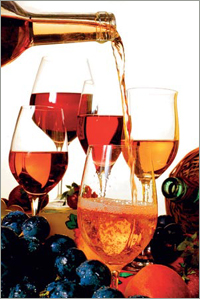
Moderate consumption of red wine may decrease the risk of lung cancer in men, according to a report in the October issue of Cancer Epidemiology, Biomarkers & Prevention, a journal of the American Association for Cancer Research.
"An antioxidant component in red wine may be protective of lung cancer, particularly among smokers," said Chun Chao, a research scientist at Kaiser Permanente, a health care organization based in California, in the United States.
Chao analyzed data collected through the California Men's Health Study, which linked clinical data from California's health system with self-reported data from 84,170 men aged 45 to 69 years. Researchers obtained demographics and lifestyle data from surveys computed between 2000 and 2003, and identified 210 cases of lung cancer.
Researchers measured the effect of beer, red wine, white wine and liquor consumption on the risk of lung cancer. Adjustments were made for age, race, education, body mass index and some other factors.
Among the study participants, there was on average a 2-percent lower lung cancer risk associated with each glass of red wine consumed per month. The most substantial risk reduction was among smokers who drank one to two glasses of red wine per day. The researchers reported a 60-percent reduced lung cancer risk in these men.
Researchers warned men to stop smoking as the best way to reduce lung cancer risk; noting that even men who drank one to two glasses of red wine per day still face higher lung cancer risk than non-smokers.
No clear associations with lung cancer were noted for consumption of white wine, beer or liquor. "Red wine is known to contain high levels of antioxidants. There is a compound called resveratrol that is very rich in red wine because it is derived from the grape skin. This compound has shown significant health benefits in preclinical studies," Chao said.
But Chao said their findings should not be construed to recommend heavy alcohol consumption.
(Xinhua News Agency October 8, 2008)